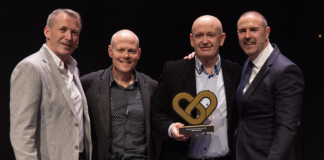In January, Bidvest CEO Andrew Selley officially took over as chairman of the Federation of Wholesale Distributors (FWD). Helena Drakakis talks to him about the challenges and opportunities the industry faces, and his background as the first foodservice wholesaler appointed to the role.
Better Wholesaling: Congratulations on your new role. Did former chairman Martin Williams arm you with any words of wisdom?
Andrew Selley: The FWD chairman’s role is not important in my eyes, but the importance comes in the strength of the FWD council. It is a unique institution, because you have all the senior members of organisations who spend their days competing against each other getting together to talk about what is good for the industry. In Martin’s view, that is a unique position and a privilege, and from my perspective, how do I carry that on?
BW: You are the first FWD chairman with a foodservice background. How will that background inform the role?
AS: When Martin was in charge, he encouraged the involvement and integration of foodservice and raised its profile, despite his retail background. So, I am not going to lose sight of the fact that we represent retail wholesalers and convenience store customers among others.
But, as a foodservice representative, I probably have less-developed relationships with tobacco or beer suppliers, for example, so it is about raising their profile in our business as well. The lines between foodservice and retail are blurring, too: there are lots of food-to-go offerings in supermarkets and convenience stores, and foodservice caterers in the contract sector are operating retail-type offerings.
BW: There will inevitably be challenges from Brexit. In what areas do you see the FWD influencing outcomes?
AS: The FWD has three roles: representing wholesale, promoting wholesale and bringing wholesale together. In each of those areas, we will have a challenging time over the next couple of years.
Brexit will be the predominant theme, so we need to understand how we can raise our profile and promote what we do up to government level. Within hospitality and the supply chain, there is a whole host of immigrants working and we want to make sure that we are protecting our colleagues. We have already started that dialogue with the Department for Exiting the European Union.
BW: Other industries may be prioritised above hospitality in the Brexit debate. How can the FWD and wholesalers champion the industry?
AS: It is a constant challenge because no one understands the amount of people employed in our industry.
Two years ago, we put out a publication called The Whole Story, which was about raising the profile of the industry. We plan on bringing out a follow-up this year called The Whole Society, which will take a broader look at our impact.
We also encourage our members to know their MPs and to make sure their MPs know their issues. It is not always about the big story – it is about the local story, too.
BW: There’s an opportunity to positively influence existing EU legislation and make it UK-centric. What areas will the FWD be specifically focusing on?
AS: We do not have a collective position at the moment on what areas we want to see reevaluated.
From a personal perspective, it is anything that creates unnecessary red tape and bureaucracy for businesses. You have to make sure you are passing legislation for all sorts of employers: we must protect the most vulnerable in the face of the worst employers, but if you are a good employer, then some of the legislation is unnecessarily restrictive.
However, in our role of bringing wholesale together, we would have to take a collective view.

BW: On the front line, inflation is going to be a major factor in the coming years. Is that a good or a bad thing?
AS: It is certainly a new thing! Perhaps not for those of us who have been around for a long time, but for others, continuous food inflation is a challenge.
Our mission is to be there for our customers, and to help them grow; they are looking to us to advise them on how to manage that challenge. In my Bidvest role, they are looking to me to challenge suppliers over what are genuine increases – we have all seen examples of suppliers raising the prices of products completely unaffected by the exchange rate. Then, our customers are looking to us to advise them on how to mitigate those rises, whether that is through changes in menu, or in ingredients or different products.
It is an opportunity for us to have more interesting and constructive conversations with our customers, while managing and minimising the impact on them.
BW: There are other pressures on wholesalers’ profits, such as the National Living Wage (NLW) and the Apprenticeship Levy. The FWD champions new talent, but how do you strike a balance?
AS: There are pressures, and it is an interesting situation. I have not met anyone who has said we should not be paying a living wage or investing in training, but it must be done fairly. There will be a difference of opinion in the FWD about our approach, but we are committed to apprenticeships. We are asking how can we make that work and how can we get a good return out of the levy?
At Bidvest, we pay ahead of the NLW, but as the FWD, we want to keep close to government to make sure that the recommendations are keeping track with what is happening in the economy. If the economy changes, we want that continuing discussion with the Low Pay Commission to direct what is the appropriate level for the NLW.
BW: As CEO of Bidvest, how do you see the foodservice landscape evolving?
AS: We have not seen a dip in consumer confidence. Day-to-day trade is strong, but if you look at some of the longer-term decisions our customers will be making, perhaps around refurbishment, then that may slow down. Customers are nervous around pricing, and they are looking to their wholesaler to navigate them through that situation. And everybody is looking to see what happens with Brexit. Our job is to make sure that we are suitably lean, and quick to respond to changes.
In terms of maintaining quality, we are very rigorous on our own-brand, which we launched last year. And quality of service is as important as quality of product. We see the delivery of the food as the last piece in the chain. Our job is to work with customers on innovation, on food trends and things that will help them to sell more.
BW: How do you navigate the gap between Bidvest being a big company, and having to understand and be responsive to local needs?
AS: Without sounding trite, we see ourselves as a local company. Our ethos is decentralised – we have been building more smaller distribution centres, and we will continue to build more so that we are never more than 80 miles from our customer.
Our competition on quality of service is from the local guys, and so all our general managers are empowered to act as local businesses. With our acquisition of South Lincs Foodservice and Caterfood, we have understood what they are doing and we have incorporated that into our wider offering.
Brakes and Booker are active competitors on national accounts, but if we are looking to pick up the local pubs and the local restaurants, we are going to be competing with a variety of local wholesalers.
BW: Are you going to have any spare time? You were learning Arabic – how is that going?
AS: A lot of my spare time is spent being a taxi service for two teenage children. I was learning Arabic when I was looking after our Middle East business, but I decided that it was too difficult. I have switched to Italian, which fills many hours sat in a car. You could say it is going “molto bene”!








